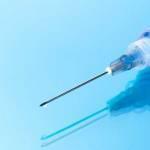Novel Treatment for Big Head Disease in Horses

Tiludronate, a bisphosphonate medication licensed for “the control of clinical signs associated with navicular syndrome,” appears to have a new use: treatment of big head disease in horses.
“Otherwise known as nutritional secondary hyperparathyroidism or NSH, big head disease results in abnormal skeletal development caused by excessive resorption, or breakdown, of bone,” explained Kathleen Crandell, Ph.D., a nutritionist for Kentucky Equine Research.
Horses with this disease have abnormally shaped skulls as well as large jaw bones, which makes chewing difficult. Affected horses are therefore often very thin due to anorexia, lame, and weak.
“The underlying cause is an imbalance in the calcium and phosphorus levels in a horse’s diet,” said Crandell.
Specifically, horses fed diets low in calcium and high in phosphorus have low circulating ionized calcium, increased phosphorus blood levels, and increased parathyroid hormone. Excess phosphorus causes parathyroid hormone to work overtime to increase calcium levels, and the best place for the body to draw calcium from is bone. Excessive bone breakdown results in the misshapen bones of the head. The limbs also can be affected, resulting in pain and reluctance to walk or even rise.
“High levels of oxalates in the diet that bind calcium or any impairment in the absorption of calcium within the gastrointestinal tract can also result in low calcium levels in the body even if the diet has an acceptable calcium-to-phosphorus ratio,” Crandell added.
Rare in well-managed horses, this condition still occurs despite being largely preventable. To help horses with NSH, veterinarians turned to tiludronate. This medication helps patients with various bone fragility disorders by binding to and inhibiting the action of osteoclasts, which are cells that break down bone. When administered at the dose licensed for horses with navicular disease, horses and ponies with NSH benefit from this medication but only if given in conjunction with a balanced diet.
“Ensure your horse’s diet has appropriate calcium and phosphorus levels. If you are unsure, consult with a Kentucky Equine Research nutrition advisor. We can also recommend an appropriate feed or a supplement to support bone health such as Triacton or Duraplex,” advised Crandell. In Australia, look for Triacton or Bone Food Plus.
*Lacitignola, L., P. Luca, R. Santovito, et al. 2018. Nutritional secondary hyperparathyroidism in two ponies. Open Veterinary Journal. 8(2):149-153.








